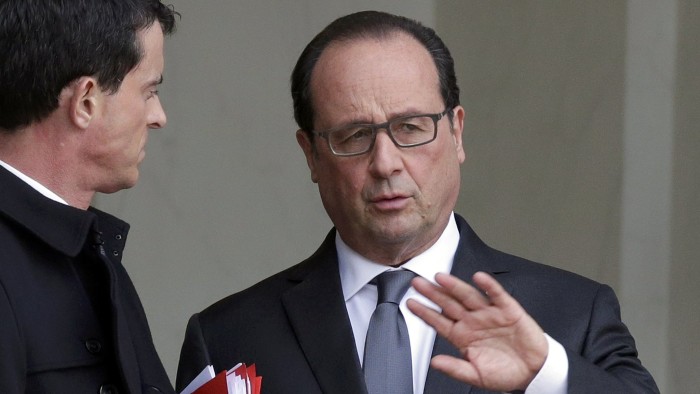Paris attacks fuel EU migration debate

Roula Khalaf, Editor of the FT, selects her favourite stories in this weekly newsletter.
Hours after the shooting stopped in Paris, France’s worst-ever terrorist attack began to reverberate on Europe’s vexed migration debate and to prompt criticism of its policies in the Middle East.
Poland’s new rightwing government on Saturday seized on the events in Paris to argue that the EU’s response to its migrant crisis was flawed and that the attacks made untenable a Brussels-led scheme to share refugees among member states.
A Syrian passport found near the remains of one of the Paris attackers was later confirmed as having been used in Greece last month.
While world leaders broadly united in their condemnation of attacks that left at least 129 dead on Friday night, Poland’s new Europe minister-designate appeared to attribute part of the blame to the EU’s decision to allow refugees and migrants to enter European countries. He said the events of Friday night meant control of the bloc’s external borders “must urgently be put on the agenda”.
“The decision of the European Council that we criticised — to allow refugees and immigrants relocation to all EU countries — still has the status of binding EU law,” Konrad Szymanski wrote in an article for the wPolityce website. “In the face of the tragic events in Paris, we do not see any political possibility of executing them. Poland must retain full control over its borders, the policy on asylum and migration.”
Andrej Babis, Czech Republic’s deputy prime minister, said the attack should prompt action from reluctant European leaders to protect the continent.
“Europe must at last start doing something,” Mr Babis said. “We as Europe are at war against terrorism. I think that it will be necessary to close the Schengen border.”
Their reaction was echoed by some public commentators in Russia, where some suggested France’s involvement in Syria, its tolerance of satire magazine Charlie Hebdo and its liberal migration policies were at least partly to blame.
Paris Attacks
The terror threat

What now for US campaign against Isis?
The knowledge of what is going on the ground is limited.
A proclamation against Isis, the party of death
Our citizens need a statement of what we must defend, writes Simon Schama.
Isis Inc: how oil fuels the jihadi terrorists
Oil is the black gold that funds Isis’ black flag — it fuels its war machine.
For all our coverage on the Paris attacks click here
“France is paying for its active participation in the destabilisation of the Middle East, and also for its overly welcoming policy on migration,” said Pavel Svyatenkov, a political scientist, in the pro-Kremlin newspaper Izvestia. “The French government actively participated in the destruction of the secular regime of Gaddafi in Libya. France is one of the sponsors of the civil war that is aimed at the overthrow of the secular government of Bashar al-Assad.”
Bashar al-Assad, Syria’s president, told French lawmakers that the country’s “mistaken policies . . . had contributed to the spread of terrorism,” according to AFP news agency.
Such reactions ran counter to the overwhelming sympathy and shock expressed by other countries. World leaders from Washington to Tehran strongly condemned the attacks and voiced their support for France.
“This is an attack on all of humanity and the universal values we share,” said US President Barack Obama. “We stand prepared and ready to provide whatever assistance that the government and the people of France need. Those who think that they can terrorise the people of France or the values that they stand for are wrong.”
The attacks appeared to remind many leaders of the vulnerability of their own countries. “This attack on freedom is not only aimed at Paris,” said Angela Merkel, German chancellor. “We are all targets, and it affects all of us . . . For that reason we will respond together.”
Prime Minister Matteo Renzi of Italy said security controls were being tightened throughout the country in an “epochal battle” that “won’t be simple” to win.
Paris attacks: Bloody atrocity signals shift in Isis strategy

Jihadi group steps up level of terror with co-ordinated attacks
Read more
Russian president Vladimir Putin sent his condolences to François Hollande, the French president, following the “horrible terrorist attacks in Paris”, the Kremlin said in a statement.
“Russia strongly condemns this inhumane killing and is ready to provide any and all assistance to investigate these terrorist crimes.”
His words were echoed by Iranian President Hassan Rouhani, who has cancelled a planned trip to the Vatican and Paris that would have been the first by an Iranian president to Europe in a decade. “I strongly condemn these crimes against humanity and offer my condolences to the grieving French people and government,” Mr Rouhani said.
The attacks will provide a sombre backdrop to a two-day G20 summit in Turkey that begins on Sunday. The fight against Isis will be one of the main topics of discussion, in addition to economic issues. China’s vice-finance minister Zhu Guangyou told reporters that leaders would have to show a united front in the fight against terrorism at the summit. “We must work together, we must enhance our solidarity,” he said.
Comments